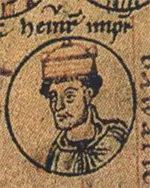Henry V: German King, Holy Roman Emperor
Henry V was King of Germany and Holy Roman Emperor during a turbulent time at the end of the 11th Century and beginning of the 12th Century. 
He was born on Aug. 11, 1086, in Goslar, Saxony. His father was the reigning King of Germany and eventual Holy Roman Emperor Henry IV, and his mother was Bertha of Savoy. They already had a son, Conrad, when Henry was born. The elder Henry's reign was filled with wars and intrigues and disagreements over authority. One of the most significant of those was the Investiture Controversy, a titanic struggle between Henry and Pope Gregory VII over who had the power to appoint Catholic Church officials within the empire. Henry claimed that right, as had his father, Henry III; Gregory considered Henry's actions to be a usurpation and strived to put the Church back on top in such matters. The pope claimed a victory of sorts when Henry sat for three days outside an Alpine castle in the middle of winter and then begged forgiveness. Various back-and-forth actions served only to muddy the waters further. Henry IV struggled to maintain his hold over the duchies of Germany as well. A handful of them banded together in revolt more than once. Henry claimed victory in 1084 and had installed as pope his own man, Clement III, who returned the favor and crowned Henry Holy Roman Emperor. This was the sort of world into which young Henry was born. Yet another rebellion sought to proclaim Conrad as sole King of Germany, deposing Henry, who had crowned young Henry as co-king in 1099. When the young Conrad died two years later, Henry fell back on his younger son as heir apparent. Son joined father in fighting against Saxon rebels for a time but, in 1104, Henry the younger switched sides, abandoning his father and seeking his abdication. King and Emperor Henry gave up both thrones at the end of 1105, but the two men fought on. Henry IV died in 1106, and his son inherited the battles against rebels. Henry V pursued a number of military and political strategies for the still roiling situation. An invasion of Poland, as an attempt to sort out the ruler of Hungary, in 1109 proved disastrous. Interventions in Bohemia the following year proved more successful. Henry also wanted to end the struggle with the Church. Henry was King of Germany and King of Italy but not Holy Roman Emperor by this time. A successor to Gregory VII, Pope Paschal II, had renewed the Church's insistence that it held sway in appointing abbots and bishops, and Henry chose to address the issue by invading Italy, in 1110. King and pope hammered out an agreement that saw Henry give up his claims to authority over appointing Church officials, and Paschal agreed to crown Henry Holy Roman Emperor, which he did on April 13, 1111. Events got in the way of progress, however, and the agreement was never notarized. On Jan. 7, 1114, Henry married Matilda, whose father was England's King Henry I. They had no children. 
Henry's struggles against recalcitrant nobles were not finished. He fought again and again, sometimes winning and sometimes losing. None of the defeats was catastrophic. In 1116, he marched back to Italy, to sort out a succession controversy, taking possession of the lands and inheritance of the powerful Matilda of Tuscany, recently deceased. Two years later, he returned to Germany, by which time the situation there had stabilized. Several years of on-again-off-again negotiations ended the Investiture Controversy in a settlement, the Concordat of Worms, in September 1122. Henry agreed to give back to the papacy the authority to appoint abbots and bishops within the empire; in return, the new pope, Callistus II, agreed to make such appointments with more transparency and nominally with the emperor's stamp of approval. Discontent was not done with Henry V. He campaigned in Holland, to sort out yet another succession controversy. He fought against French forces under Louis VI in 1124. A year later he was dead, succumbing to cancer on May 23, 1125. Henry V was the last of his line. He had no children, and so his line ended. The next Holy Roman Emperor was Lothair III. |
|
Social Studies for Kids
copyright 2002–2024
David White




